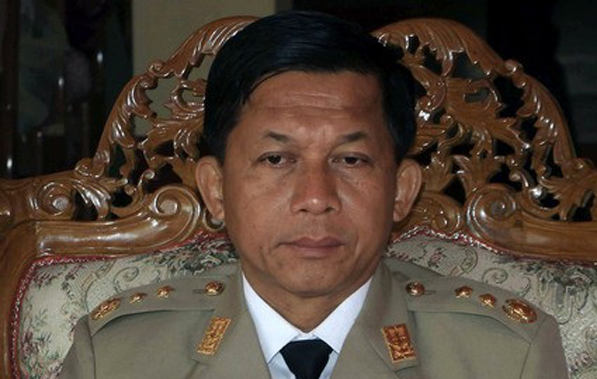Burma’s Commander-in-Chief to Visit China

A high-level military delegation led by the commander-in-chief of Burma’s armed forces, Gen Min Aung Hlaing, is scheduled to visit the country's closest ally, China, in the middle of this month, on what will be the first top military visit to China since Burma's new government was sworn in in March.
While Min Aung Hlaing will take the opportunity to introduce his deputies to their Chinese counterparts, the Burmese delegation’s top priorities involve easing the ethnic tensions on the Sino-Burmese border, creating border stability and increasing military cooperation between the two countries, intelligence sources said.
Min Aung Hlaing took over on March 30 as commander-in-chief, succeeding Burmese junta supremo Snr-Gen Than Shwe. His last China visit was in September when he accompanied Than Shwe who introduced him to several leading Chinese officials.
Both Min Aung Hlaing and deputy commander-in-chief Lt-Gen Soe Win are reputed among Burma's military generals as being savvy on Sino-Burmese border issues as they served as regional commanders in the area.
Since Naypyidaw’s military offensive against the Kokang army—officially called the Myanmar National Democratic Alliance Army—in August 2009, when some 37,000 refugees fled onto Chinese soil, Beijing has raised concerns about “peace and stability” along its Burmese border.
In his first policy comment on ethnic issues, Thein Sein signaled at a meeting of the Central Committee for Progress of Border Areas and National Races on April 23 in Naypyidaw that the regime would maintain centralized power over ethnic issues.
“It is important that administration machinery of the Union Government to reach out to whole nation, [sic] including far-flung border areas,” Thein Sein was quoted as saying in state-run-newspaper The New Light of Myanmar.
“Peace and stability is essential in building a developing nation,” he reportedly said, adding that the country cannot enjoy peace and stability without national unity among its more than 100 national races.
Thein Sein also reportedly spoke about the three “main national causes”—non-disintegration of the Union, non-disintegration of national solidarity, and perpetuation of sovereignty— imposed by the previous military regime, which he served as prime minister from 2007 to 2011.
The new president referred to them collectively as “a national policy” of unity. He also vowed development in ethnic areas as a solution to ensure unity with ethnic minorities.
However, Thein Sein did not make any mention anything about a genuine dialogue with ethnic armed groups nor did he suggest greater autonomy and civil rights for Burma's ethnic people—issues that are demanded as a prerequisite to any agreement by the ethnic armies that have rejected Naypyidaw's Border Guard Force plan.
Meanwhile, Gen Xu Caihou, a vice chairman of the Central Military Commission of China, is scheduled to visit Burma after Min Aung Hlaing’s China trip, sources said.
Xu Caihou is one of three vice chairman of the Central Military Commission—alongside Gen Guo Boxiong and Vice-President Xi Jinping—under Hu Jintao’s chairmanship. He became vice chairman of the Central Military Commission in September 2004.
|
||
|
||
- 'My Wife Died From Police Abuse,' Says Husband
- US Says Observer Conditions Don't Meet Int'l Standards
- 159 Observers to Monitor Burma Election
- Govt to Address Breaches of SSA-South Ceasefire: Aung Min
- Burma Investors Pin Hopes on Seminal Sunday
- Malaysia PM Leads 50-Strong Delegation to Burma
- US Congress to Assess Burma's Political Prisoner Issue
- Rangoon Woman in Police Station Death Plunge
- Burmese Legal System Remains Tool of Govt: AHRC
- Burmese Army Chief Defends Political Role
